In her grief, Nerys is finding “little bits of joy” again
For Nerys Welch, “grief sucks” in so many ways. And she says, “it never goes away”.
She will always miss her late husband, Richard, who she affectionately calls Rich, and not just in the past but in the present.
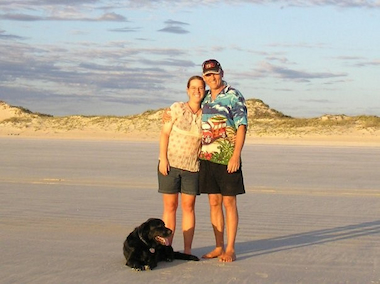
“You miss that they are not there, at all future events,” Nerys explains.
Special days, anniversaries, and birthdays “are really rough but sometimes it’s the things you don’t expect to hit hard, like signing Christmas cards without his name and it just feeling wrong”.
For Nerys, it’s also waking up every day and remembering her husband is no longer there. It’s having a nightmare about waking up alone and realising the nightmare is actually real. And when the calendar year changes, “you realise you are living in a whole new year that they never lived in”.
Decision-making is hard for Nerys without her Rich there to talk to and having “widow brain fog makes it hard to think or concentrate”.
“We’ve got three kids who are now 16, 15, and 13. They all have special needs – different types of autism, and I’m their full-time carer,” says Nerys.
“I’ve got no family around and I also home-school them, so it’s full-on. My life’s crazy.”
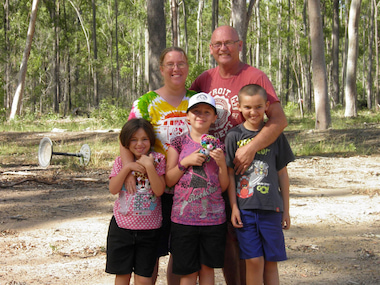
Her husband’s diagnosis with blood cancer and years of treatment
Richard, who was diagnosed with T-cell acute lymphoblastic leukaemia in mid-2012, was “very sick for many years” and had a lot of complications.
“For the seven years until he passed away, we were always going to the hospital,” says Nerys, and there was only one point when his appointments got down to being a month apart.
She never thought he wasn’t going to make it, so his sudden death in Brisbane in August 2019 was a “massive shock”.
“It was so unexpected and at that point I was exhausted, I was a zombie,” says Nerys about what turned out to be Richard’s final time in hospital in Brisbane.
He was there because he needed special permission to access a new medication which hadn’t yet been released in Australia. While Richard was being treated, Nerys and the children were living at the Leukaemia Foundation’s Clem Jones-Sunland Village. The family hadn’t been home to Bauple (three hours north of Brisbane) for three months.
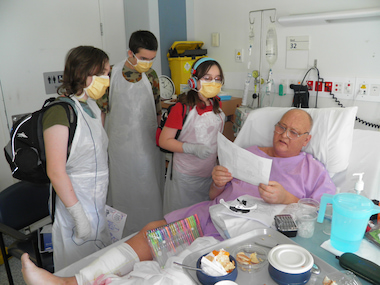
Two weeks after starting the drug, Richard’s haematologist told Nerys that “it wasn’t looking good”.
“It was the first time there’d been any mention that things were not going to turn out well, and that maybe in the future they’d have to start thinking about palliative care,” says Nerys. But Rich just kept getting worse.
“I was in shock when he passed away [four days later] and being at the leukaemia village was good. The people there are amazing. They helped with practical stuff – working out who I had to contact, and just as a support.
“Rich was cremated, and they let me stay another two weeks until I got his ashes so we could all travel home together, which was really nice of them.”
For Nerys, who was sleep-deprived, this extra time in Brisbane gave her the ability to sleep a lot and to pack up and get sorted before going home.
Living regionally with blood cancer
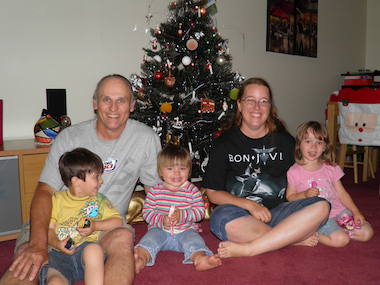
Nerys said the family had lived “in the middle of nowhere” near Goondiwindi prior to Richard’s diagnosis.
“When he got leukaemia, he was like… ‘we’ve got to move somewhere better, somewhere closer to Brisbane’, but we didn’t have much money,” says Nerys.
Richard was a builder and in 2016 the couple bought a block of land at Bauple. They moved there and lived in a caravan while they built their house themselves.
“When Rich died, the house wasn’t finished. It wasn’t anywhere close to liveable,” says Nerys, and it took her two years to complete the build, thanks to money raised through GoFundMe.
“Obviously there was a lot of stress. I don’t really remember those first few years. You’re just in survival and your brain doesn’t work. It’s this fog, and it takes a long time for that fog to lift. You’re surviving and a lot of it is blurry.
“I just focused on getting the house done so we could move in. I had to keep going and I had to look after the kids; none of that day-to-day stuff changed, so I wasn’t able to fall apart,” she says.
“I definitely had crappy days, but I haven’t had the full-on bawling-your-eyes-out-for-days thing because I haven’t had that chance.”
“In some ways, I feel like that’s still got to come. I’ve got to feel the feeling, if that makes sense?”
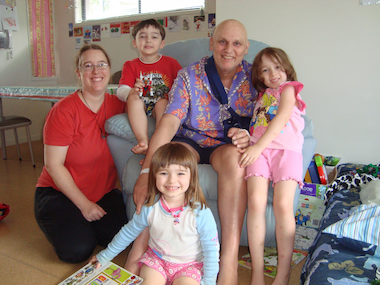
Moving in and moving forward
Finally, in mid-2022, Nerys and the children moved into their new home.
“Now I’m just starting to be able to concentrate or think, and to feel a bit more human.
“I’m connecting with other people, with other widows, and it’s good to start that process.
“Now I can actually read a book again and I’m reading more books about grief, which have been really helpful. And I’m starting to focus more on what I need, rather than just pure survival.”
She has joined several online widow groups and once a month Nerys talks to Shirley Cunningham, one of the Leukaemia Foundation’s grief and bereavement support staff.
Late last year, Nerys took part in a four-week Bereavement Support Group that was presented and facilitated on Zoom by the Leukaemia Foundation.
“There were about 15 of us and we’d all lost someone to blood cancer. The first week we talked about how our person died, the second week we talked about what they were like, and we all brought a photo, which was really cool,” says Nerys.
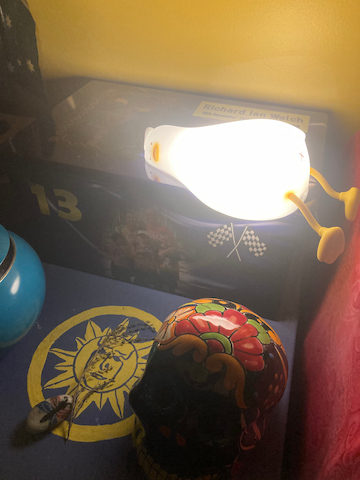
“The hardest thing I’ve found, as time’s gone on, is that nobody talks about him [Richard]. People don’t mention his name. And we all felt the same – it was just so precious to say their name, show a photo and share stories. It meant so much and that was my favourite session of the four.
“In the third week we learnt more about grief, and the last one was about self-care and what the future could look like,” says Nerys.
“It was really good because we all had the connection of grief, but the connection of the blood cancer as well.”
“That’s the biggest thing that’s helped me – having contact with other people who get it, because you just feel so lonely and you’re the only person who’s in this weird, messed up world and everyone else is carrying on as normal.
“But then when you go to that [support group series] and you hear others’ stories. Everybody’s different and everyone’s coping differently and there are little bits from each person that you can connect with.
“At first you feel like, oh I can’t go to this, but you participate as much as you want to. There’re people who don’t talk much and who listen, and you get a lot even if you just listen to other people, or you share stuff if you want to.
“It’s a really safe place where it’s okay to cry and it’s okay to be happy. You’re not being judged, and you can say something, and people already get all that background stuff.”
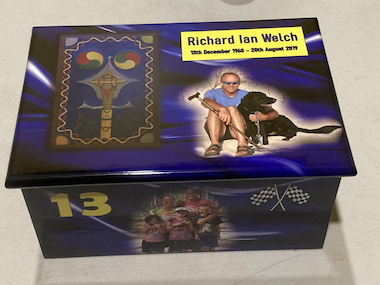
“So, if you say, ‘the tap was leaking and I fixed it’, people get how huge a deal that is. You don’t have to explain… ‘my husband died, and he always did this’… they already know all that. So yeah, it was great.”
“Bits of joy” are appearing again
Nerys is starting to feel more functional and more able to process her grief.
“The fog is lifting. That’s the biggest thing that’s changed, and now I can connect with other people and I’m more confident and capable in myself to go to a Zoom meeting and interact with others.
Joining an online widow’s book club was something that wasn’t essential and wasn’t for the kids. It was something she wanted to do, and Nerys described that as a big “widow win”.
“Actually choosing to do something that I would get enjoyment out of was a huge step.”
“That’s where I’m at. I’m starting to look at life, like… okay, there can be bits of joy in it. I’m still sad, it still sucks, but I can find little things that make it just a little bit better. You’ve got to grab those when they’re there.
“It’s like… this is now my life – he’s not coming back. It takes a while to sink in, to be able to process it all.”
Having Daddy-themed days together
Nerys said she and her three children are really close, and while they are all different in how they are each coping with their father’s death, they love talking about him. And when birthdays and anniversaries are coming up, they sit down together as a family and make plans.
“Everyone gets to say what they want to do or don’t want to do, then we work it out together. It’s good to be open and honest and to have those discussions,” says Nerys.
Daddy-themed days are a favourite – it’s a day at home doing daddy things.
“We get food that Daddy likes, the fizzy drinks Daddy likes, we have a meal he likes, and watch a movie he liked or play on the Xbox. We love doing that and talking about him,” says Nerys.
“And they’ll bring Daddy out.”
Nerys is referring to the custom-made urn that contains Richard’s ashes. She and the children chose the colours, photos, and a piece of Richard’s artwork that decorates the wooden box, to represent him, and it has its own little cushion.
“He comes out and watches the movie with us.”
Advice to other people who are grieving
Nerys says, “there is no right or wrong way to grieve”.
“Whatever you need to do to help you get through that day, that hour, that minute, that second, is the right thing to do.
“If you need to be distracted and to keep busy, or if you need to sit and look at the photos and cry, nothing is wrong, nothing’s right. It’s whatever works for you and what works for your family,” she says.
“And for other people who are trying to help [someone who’s grieving], it’s not a problem to be fixed.
“You can’t make it better. You can’t make it go away. You can’t change it. But you can be there for that person. If they’re sad, just sit with them, listen to them. If they want to be distracted, help them be distracted, but do what the grieving person needs at that time, not what you think they need.”
Grief-based resources that have helped Nerys
On Facebook, Nerys joined the Widow Wives Club, which has an unofficial mascot – a duck-shaped lamp called the ‘Existential Crisis Duck’.
“I bought one and it’s ridiculous, but it brings me comfort because I can look at it and know other widows are out there with this duck… it’s that connection, and it helps.
“It’s my little buddy now. I’ve named him Marvin, after the robot from The Hitchhiker’s Guide to the Galaxy, who’s always really miserable. It’s adorably cute but just looks so sad, which sort of sums it up.
“Being a mum of kids with autism, when I talk to other parents of kids with autism, you’ve got that connection and it helps. Grief is no different. It’s finding the people that can help and each group is different.
“You’ve got to try different groups and find the one that fits with where you’re at in your journey,” Nerys suggests.
“It’s the same with books on grief. If I’m in an angry kind of feeling of grief, I have a certain person whose podcast I’ll listen to, and I’ll read their book because it’s simple and it just works for me.
“And then, if I’m feeling a different way, I’ve got others, so it’s finding things that work for you in the different emotions you get.
“Honestly there are so many books, podcasts, and groups, so it’s a matter of trying different ones and finding what makes sense for you at that moment in your journey.
“Some helped earlier and some help more now, and some just depend on what kind of day I’m having.
“Here are some, in no particular order,” offers Nerys.
- Widow we do now? and Widow Wives Club. “They have a Facebook page and an app with everything in one place which is very helpful – podcasts, music, and monthly Zoom hangouts.”
- Modern Widows Club. “Also on Facebook, and the website has a lot of Zoom meeting options for meeting other widows, a monthly book club and art club, and other groups, and a virtual group too that meets online monthly.”
- My Person Died Too – John Polo. “A podcast he does with an Australian grief coach. He has written a few books and has a Facebook page.”
- David Kessler. “He has written books, has a Facebook page, podcasts, and has virtual meetings with others but you have to pay, so I haven’t tried that part.”
- Refuge in Grief – Megan Divine. “Has a website, Facebook group, and a book, It’s OK that you’re not OK. This was the first book on grief I got. I found it hard to read because I couldn’t concentrate at the time but the biggest thing that helped me was the statement, ‘grief is not a problem to be solved’. That helped me a lot in the early part because everyone wants to fix you, they want to fix this problem, but grief isn’t something that can be solved.”
There are Australian-based Facebook groups run by other widows. “You just have to try and see what works”, and the Leukaemia Foundation’s Grief and Bereavement Community on Facebook.